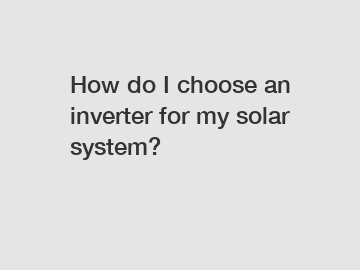How do I choose an inverter for my solar system?
As the world gravitates towards renewable energy, more and more homeowners are opting for solar power systems to reduce their carbon footprint and save on energy costs. One crucial component of a solar system is the inverter, which converts the direct current (DC) generated by solar panels into alternating current (AC) for use in households. Choosing the right inverter for your solar system is paramount to ensure optimal performance and maximize cost-savings. In this blog, we will guide you through the process of selecting an inverter, considering factors such as efficiency, type, capacity, and brand reputation.
1. Efficiency Matters:
Efficiency is a key consideration when choosing an inverter. Look for inverters with high efficiency ratings, as they convert more DC power into usable AC power. Highly efficient inverters enable you to generate and utilize more electricity, an important aspect if you aim to drastically reduce your dependence on the utility grid. Additionally, efficiency directly impacts your overall financial returns, as a more efficient inverter means greater energy savings over time.

2. Types of Inverters:
There are multiple types of inverters available in the market, each with its own distinct advantages and disadvantages. Let's discuss a few common types:
a) String Inverters: Traditional and widely used, string inverters work by connecting multiple solar panels in a series, converting DC power collectively. They are known for their affordability and reliability but are prone to reduced output if a single panel is affected by shade or malfunction.
b) Microinverters: These are small inverters attached to each individual solar panel, allowing them to work independently. Microinverters mitigate the issue of panel-to-panel performance disparities and shade, as the output of one panel does not affect others. While typically more expensive, they offer greater flexibility and enhanced overall system performance, especially if you have shading concerns.
c) Power Optimizers: Similar to microinverters, power optimizers are paired with each solar panel within the system. They optimize power output at the panel level, providing a compromise between string inverters and microinverters in terms of cost and performance. This technology ensures higher energy harvest in partially shaded scenarios without the increased expense of microinverters.
3. Capacity and Sizing:
Inverter capacity should align with your solar system's power output to ensure seamless performance. Oversized inverters can be as detrimental as undersized ones. While oversized inverters may seem appealing due to their lower costs or potentially higher output, they can reduce efficiency and lead to premature aging of the system. On the other hand, an undersized inverter may limit your system's potential and reduce overall energy generation. Consult with an expert or refer to manufacturer guidelines to size your inverter appropriately for optimal results.
4. Trustworthy Brands:
When it comes to choosing an inverter, sticking with reputable brands is crucial. Recognized brands often provide better warranty coverage, technical support, and quality assurance. Opting for established brands ensures that the inverter you select has undergone thorough testing, adheres to industry standards, and is likely to exhibit better reliability and longevity. Invest ample time in researching renowned manufacturers and gather insights from customer reviews and industry publications to make an informed decision.
5. Additional Considerations:
a) Monitoring capabilities: Some inverters offer advanced monitoring features that allow you to track your solar system's performance in real-time. Monitoring provides valuable information such as energy generation, efficiency, and even potential issues, aiding in the prompt resolution of any system concerns.
b) Compatibility with battery storage: If you plan on integrating battery storage into your solar system in the future, ensure the chosen inverter is compatible. Not all inverters support battery storage, so future-proofing your system from the start can save you from expensive upgrades down the line.
c) Safety and certifications: Verify that the inverter you select meets safety standards and certifications specific to your region. Safety certifications ensure that the product is manufactured and tested under controlled conditions, minimizing any risk of accidents or malfunctions.
Conclusion:
Purchasing an inverter for your solar system requires careful consideration of factors such as efficiency, type, capacity, brand reputation, and future compatibility. By understanding your energy requirements, evaluating options, and seeking expert advice, you can make an informed decision that optimizes your solar system's performance and long-term financial benefits. Remember, investing in a high-quality inverter now will translate into decades of clean, efficient, and cost-effective solar energy for your home.
The company is the world’s best senergy, 1 phase hybrid inverter manufacturer, three-phase inverter supplier. We are your one-stop shop for all needs. Our staff are highly-specialized and will help you find the product you need.
443
0
0


Comments
All Comments (0)